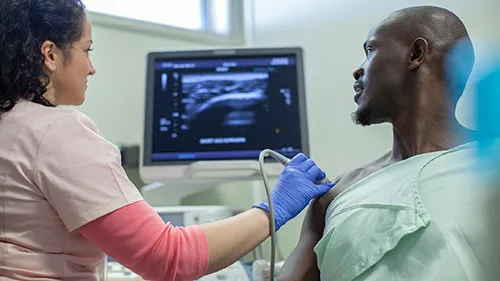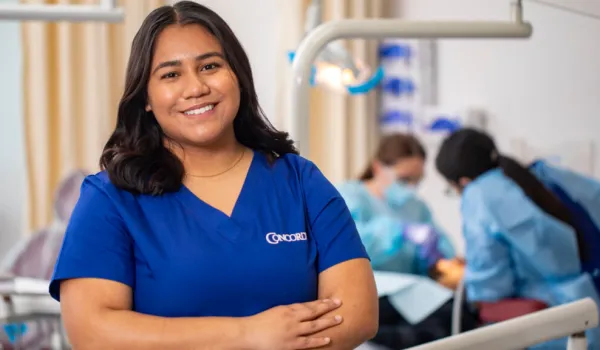
Sonography is a diagnostic test that uses high-frequency sound waves to create detailed images of different parts of the body to detect anomalies and make diagnoses. Without sonography, it would be much harder to treat a range of conditions. The sonography field has a lot to offer students who have the desire to make a difference in the medical field and grow their technical skills. By learning more about this field, prospective students can ensure that they make the right career decision.
What Is Sonography?

Introducing Concorde's Diagnostic Medical Sonography Program
Sonography or diagnostic ultrasound is an imaging method that uses sound waves to produce images of structures inside the body, including tissues, organs, and blood vessels. Medical professionals use it to detect everything from heart disease to gland abnormalities. Ultrasounds are one of the most common forms of diagnostic imaging, and they can be especially useful during pregnancy. Women typically receive a few ultrasounds during pregnancy to confirm the due date and check to see that the baby is developing properly.
Benefits of Sonography
Sonography offers several advantages in comparison to more traditional diagnostic approaches. Since it's noninvasive, it's much easier to get images of the inside of the body and pinpoint the source of a patient's condition. Little prep is necessary beforehand and there are no incisions required, so patients can get it over and done fairly quickly. Unlike an X-ray, sonography uses sound waves rather than radiation, so no ionizing radiation exposure occurs. This makes it the safest and most preferable way to image a pregnant woman or a young child.
Types of Sonography Careers
There are many different types of sonography, and each serves a distinct purpose and offers a unique career path. Here are several concentrations within the field:
Diagnostic Medical Sonography
Diagnostic medical sonography uses imaging equipment to create images of internal organs. A diagnostic medical sonographer would then analyze those images to diagnose and treat various medical conditions. There are many smaller concentrations within medical sonography. For example, a medical sonographer might specialize in imaging the musculoskeletal system or the body's blood vessels. The use of specialized equipment may be common in this concentration, and professionals typically need a high degree of technical expertise.
Cardiovascular Sonography
Cardiovascular sonography involves the use of imaging equipment to detect heart problems in patients. It captures images of the heart, including its chambers, valves, and blood vessels, allowing cardiologists to recommend a treatment plan quickly. Two- and three-dimensional equipment helps physicians observe the structure of the heart and the blood flow to determine if there are any blockages or significant issues that need addressing.
Abdominal Sonography
Abdominal sonography involves examining the internal organs that make up the abdomen, including the liver, pancreas, gallbladder, spleen, and kidneys. Abdominal sonography helps treat a wide range of diseases, including kidney stones and cancers. Sonograms and ultrasounds can help guide procedures like biopsies and help physicians uncover the source of strange abdominal pains.
Obstetric Sonography
Obstetric sonography looks at the fetus while it's still inside the womb. It assesses the condition of the fetus and the pregnant woman to diagnose any congenital abnormalities, observe the position of the fetus in the womb, and estimate the expected date of birth. Doctors usually only recommend obstetric sonography when there's an important medical need for it, but some women might choose an elective ultrasound to see the fetus for themselves. Most women get at least two ultrasounds during pregnancy (1).
Neurosonology
Neurosonology takes diagnostic images of the brain and nervous system using methods other than traditional ultrasounds and sonograms, such as a transcranial Doppler machine. This machine uses sound waves to explore the blood flow to the patient's brain and detect aneurysms and abnormalities. The internal images the machine takes can also help doctors diagnose medical conditions like cerebral palsy and encephalitis.
Musculoskeletal sonography
Musculoskeletal sonography involves taking pictures of the muscles and parts of the skeletal system to allow doctors to see the muscles, joints, and tendons inside the body. This type of sonography is useful for locating muscle tears and strains before more damage can occur. It can also help doctors look for signs of arthritis and osteoporosis. Sonographers in this concentration may specialize in sports medicine and help athletes recover from an injury on the field.
What Do Sonographers Do?

A Day in the Life of Two Sonographers
Sonographers have a wide range of duties that can vary slightly depending on their specialty. Their first responsibility usually involves collecting their patient's medical history, asking them about the concerns they might have, and answering any questions about the procedure. They then conduct the ultrasound scan with the observing physician and create the sonograms that they'll then use to make a formal diagnosis.
It's necessary that sonographers understand how to use the equipment to obtain sonographic images properly. Diagnostic medical sonographers typically use a transabdominal machine to create two-dimensional images to examine the abdominal organs. They might also use two-dimensional and four-dimensional ultrasound equipment and transvaginal or transrectal scanners. Many advancements in medical technology directly affect sonographers and help them perform their duties more effectively. It's often important for sonographers to keep up to date with the latest advancements in the field.
Do Sonographers Differ From Ultrasound Technicians?
Sonographers and ultrasound technicians often have the same job. They both might perform an ultrasound and produce a sonogram to help treat patients. In some cases, sonographers might have more responsibilities and more specialized knowledge related to sonograms and equipment. They might also take on a more active role in helping diagnose patients and constructing treatment plans. Due to their additional expertise, it may be necessary that these professionals complete additional training before they can begin working in a medical facility.
Is Sonography a Good Career Field?

Top Reasons To Train for a Career in Cardiovascular Sonography
Sonography is one of the fastest-growing medical careers that require an associate degree and specialization. With a projected growth rate of 10% through 2031 (2), there's a demand for the position in a wide range of health care settings, including hospitals, walk-in clinics, and doctor's offices. Although most sonographers work in full-time roles, part-time work can also be common. The job can offer a higher degree of flexibility than many jobs in the medical field, allowing professionals to have a good work-life balance and establish more positive working relationships.
Sonographers also play an important role in the early detection and treatment of disease and injury, making it an especially rewarding career. These medical technicians have the opportunity to work closely with both doctors and patients and make a real difference in the lives of the patients they treat. They're often among the first to access all the cutting-edge new technologies available to mitigate and prevent disease. They're also not usually tied down to a single facility or concentration.
What Are the Licensing or Certification Requirements?
Licensing and certifications aren't typically necessary to work as a sonographer, but individual employers may have varying requirements. Individuals interested in pursuing a full-time career in sonography should consider enrolling in an educational program to help them acquire the skills needed to perform ultrasounds and diagnose patients.
What Education Level Is Required To Become a Sonographer?
Like most medical careers, employers expect sonographers to have a certain level of education. To work as a sonographer, it's necessary to first complete a one-year certificate program or a two-year associate degree program. Completing a program allows aspiring sonographers to develop the skills they need to perform a variety of diagnostic procedures, obtain clear images, and summarize their findings to doctors and other medical professionals.
Compared to other health care professionals, sonographers don't need to spend years poring over books and preparing for exams. Concorde offers two associate degree programs in sonography that take as little as 20 months to complete. Both programs include lab work designed to equip students with the technical expertise needed to perform examinations, use an ultrasound machine to conduct ultrasound images of the body's internal organs, and become skilled professionals.
The program also integrates traditional classroom instruction with clinical instruction to provide students with the opportunity to learn how to record a variety of medical data and apply critical thinking and problem-solving to a range of different situations. Concorde's education programs offer hands-on training and clinical experiences to provide students with the opportunity to gain the experience necessary to work with the human body and obtain entry-level employment. In addition, financial aid and a variety of scholarships are available to students concerned with the expenses related to continuing their education.
Interested candidates can contact us online for more information about our sonography programs and the curriculum we offer. Simply complete the online form and instantly get a helpful resource to use as guidance when exploring various career training options. We also offer several other in-demand health care degree and diploma programs with educational and vocational training. Our programs take less than two years and can prepare students for a rewarding career in a range of health care positions.
Footnotes
1. "Ultrasounds During Pregnancy: How Many and How Often?", Beth Israel Deaconess Medical Center, https://www.bidmc.org/about-bidmc/wellness-insights/pregnancy/2018/09/ultrasounds-during-pregnancy-how-many-and-how-often
2. "Diagnostic Medical Sonographers and Cardiovascular Technologists and Technicians," U.S. Bureau of Labor Statistics, https://www.bls.gov/ooh/healthcare/diagnostic-medical-sonographers.htm
Take The Next Step Towards a Brighter Future
Interested in learning more about our Diagnostic Medical Sonography program?
We have a Concorde representative ready to talk about what matters most to you. Get answers about start dates, curriculum, financial aid, scholarships and more!







